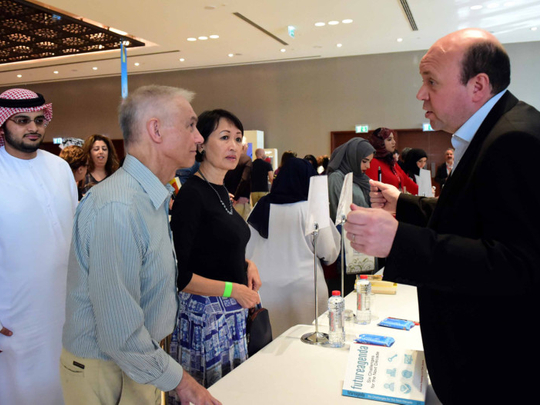
Dubai: Will the robots steal our jobs? Will people stop driving? Will technology destroy the borders? These are some of the questions that come to our minds as we see artificial intelligence getting more and more powerful.
While, we can get the accurate picture only in the coming years, experts in a new research try to explore the trends going forward.
Co-authored by Tim Jones and Caroline Dewing, the research titled ‘futureagenda — Six Challenges for the Next Decade’ explores how increasingly connected and rapidly transforming technologies are changing perspectives and traditions.
Presenting the gist of the book that explores trends in 45 countries, Jones said the idea of the book is to help people understand what is going to happen in this increasingly complex yet connected world in the next 10 years and enable these people at different levels take informed policy decisions.
Among the most startling developments that the research indicates is the shifting balance of power from the West to the East.
“The centre of power will continue to shift towards the East, where it always was for thousands of years. The political and economic power had moved to the West some 200 years ago, but the gravity is now moving back to the Middle East and Asia with China and India taking the lead,” said Jones, highlighting the fact that the realities and population and resource locations are overwhelmingly in the favour of East.
Watch: Jo Malone is in Dubai! She shares secret tips on how to properly apply fragrances.
Rise of cities
With cities already generating 80 per cent of the world’s GDP, Jones said the future lies with megacities taking prominence over countries.
The research predicts 41 megacities globally by 2030, with greater interconnectivity between them.
“Cities will become connected, closer communities, with successful cities designed and operated on the needs and desires of its citizens. Cities move faster and will take lead in taking initiatives in terms of adopting green technologies and mitigating climate change as is already happening and as a result attract best of minds and resources,” said Jones.
He added people are increasingly looking for the mayors of the world cities for leadership in terms of adopting smart solutions to problems like congestion, pollution, automation etc.
With internet and social media triggering a new wave of information explosion, the research shows that the nature of trust in the source of information is changing.
“The nature of credibility is changing. The perspectives on what is and what is not a credible source of information are likely to change forever. The whole nature of who we believe and why we believe is fundamentally shifting. We are at a turning point in the information dissemination chain and this will become more visible in the next few years,” said Jones.
He said that among the dozens of ideas, there are only four things that the majority of the people agreed about.
“One of the things that people expect is that in 10 years everything in the world that could be connected will be connected. The whole Internet of Things is actually happening right now. We are going to have all the connectivity and information and how we are going to use it is the challenge,” said Jones.
Autonomous vehicles
According to the research, another major development that people expect is the automation of transport such as driverless cars.
He said the technology is already there and soon it will be in use, but what is required urgently is the legislation to govern the automation which is yet to happen.
“Everybody seems quite excited about the autonomous vehicles but will these be used anytime soon. The general view is that we will probably see fully autonomous vehicles on highways pretty soon, but it will take longer for them to be on the city roads because of the lack of regulations. What is happening is that autonomous trucks will be on the highways first, with trials already happening in Nevada, Australia and Germany,” he informed.
He also added that robots won’t take majority of jobs from humans just as yet as ethics of their employment are yet to be decided.
Among the cities explored for the trends include Dubai, Mumbai, Shanghai, Beirut, Mendoza and Jakarta.
Curtains down on festival
Curtains came down on the 9th Emirates Airlines Festival of Literature on Saturday, with a series of interactive sessions, workshops and panel discussions bringing an end to a resourceful 10 days.
The festival saw more than 180 authors, including 70 writers from the UAE and the Arab World participate, including 120 authors attending for the first time.
Among the big names included prolific storyteller Jeffrey Archer, celebrated Emirati writer Dr Hamad Al Hammadi, queen of crime writers Kathy Reichs, veteran Emirati author Abdul Aziz Al Musallam and multi-award-winning journalist Christina Lamb.
Built to nurture the love of the letter among the youth, the festival is one of the biggest literary platforms in the UAE.












